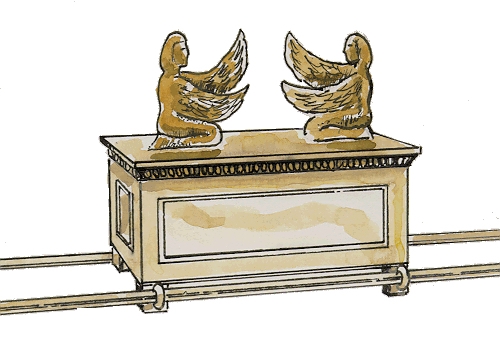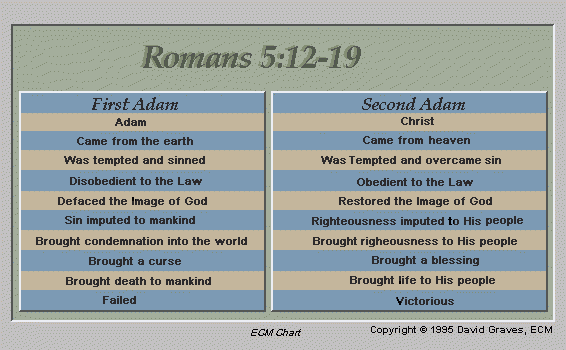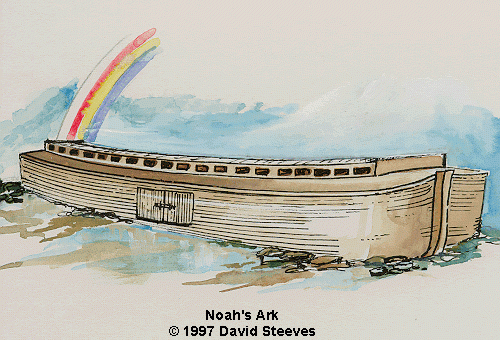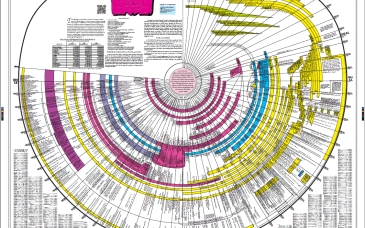Definition
The term Covenant in the Old Testament means to fetter, bondage, binding, an intensified oath, where the oath is part of the covenant, a contract. In the New Testament the term signifies an agreement, testament, or will. A Covenant then is an agreement between two parties, a greater to a lesser of unequal status made on certain terms. One party performs it, the other fulfils it.
There are basically two types:
A. Parity Covenants: These are made by equals as in man to man; equal status.
B. Suzerainty Covenant: These are treaties or agreements from a greater to a lesser; unequal status. They have Hittite roots. These type of treaties were discovered in the city of Mari by a French expedition in 1933. They uncovered a royal archives with these type of agreements. A death of an animal was performed to solemnise an oath of alliance between two parties.
Parts to a Covenant
1. Preamble
The preamble identifies the Suzerain or Ruler. 'I am the Lord Thy God'. Exodus 20:2
2. Historical Prologue
The Historical prologue is place at the beginning and identifies the relationship between King and subjects or vassal. 'Which have brought thee out of the land of Egypt, out of the house of bondage.' Exodus 20:3
3. Stipulations
Then the stipulations are listed. This is what is to be expected from the subjects. The details of the duties and obligations of the vessel as they are imposed by the Suzeraine. 'Thou shalt not...'
4. Blessings and Cursings
Next the consequences of obedience and disobedience are given. 'For I the Lord thy God am a jealous God, visiting the iniquity of the fathers upon the children unto the third and fourth generation of them that hate me. And showing mercy unto thousands of them that love me, and keep my commandments.' Exodus 20:5,6
5. Protection

The deposit of the oath in a safe place and public readings. The Decalogue was placed in the Ark of the covenant in the holy of Holies for safe keeping and publicly read to the people.
6. Witnesses
A list of witnesses to the documents is attached. It is usually the names of the gods and goddesses. 'And all the people saw the thundering, and the lightning's, and the noise of the trumpet, and the mountain smoking: and when the people saw it, they removed, and stood afar off.' Exodus 20:18
This is the form of the Suzerainty treaties, but is also the format of the Covenant in Scripture. The Ten Commandments are fashioned after this pattern Exodus 20 as is the entire book of Deuteronomy. It is not an agreement established on the basis of equals. They do not share in the formulation of the stipulations of the covenant. They do not come to the conference table as equals. God does not ask for our opinions regarding items to be included or excluded. The Lord of the universe does not abdicate His position of sovereignty when He enters into solemn agreements with His people.
This does not mean that they are all one sided but God sets forth the conditions of the covenant and man is to respond in faith and obedience.
The eternal plan of redemption was included in God's eternal plan. 'According as he hath chosen us in him before the foundation of the world, that we should be holy and without blame before him in love:' Ephesians 1:4 It was entered into between God the Father and His co-eternal Son, for the salvation of sinners. Titus 1:2; Hebrews 13:20 The Parties are mentioned in Psalm 2:7-9. Christ speaks of promises made to Him before He came into the world, and repeatedly refers to a commission which He received from the Father. John 5:30,43; 6:38-40; 17:4-12
This covenant was made with Christ, as the head or representative, of His spiritual seed. Romans 5; 1 Corinthians 15:45,47 It has its origin in the free grace and sovereign will of God. Ephesians 1:3-6
God freely offers life and salvation through Christ to sinners. It is the free offer of the Gospel to all men. But the Covenant of Grace is not a covenant of works. It does not require that we work to merit salvation. However there are requirements and obligations.
Requirement
Faith is required. The covenant is to be accept by faith. Faith is only the instrument or means of obtaining an interest in the salvation offered in the Gospel. Faith is the pipeline through which grace flows to us.
Obligation
Believers are obligated to obedience. They are to give themselves to the covenant in obedience.
Promises
As a result promises are given by Almighty God to all who believe and partake of this covenant. These promises include temporal blessings, justification, sanctification, and final glorification in a life that never ends.
Adamic Covenant
This is also known sometimes as the covenant of works. Not that man must work for his salvation but rather God requires total obedience to his law for acceptance into his presence. Adam was under this covenantal agreement before the fall into sin. Hosea 6:7; Genesis 2:16,17 God commanded obedience and promised life Romans 10:5; 7:10; Matthew 19:17 but Adam and Eve disobeyed and brought death. The law was positively written on Adam's heart so God gave him a negative command to bring to his consciousness the possibility of sin.
First and Second Adam

This covenant is still in effect in the economy of God however after the fall man is unable to meet the conditions of perfect obedience. 'But they like men (Adam) have transgressed the covenant.' Hosea 6:7 Because man is born in original sin he is separated from God and therefore Man who owes God total obedience (Covenant of works) is unable to attain the reward of life. Therefore God has condescended voluntarily to enter into covenant with man. Thus as the Federal head and representative for His people Christ, the second Adam, meets them as the mediator for His people. Christ fulfilled the requirements of the covenant of works on behalf of His people. which now becomes the eternal foundation for the covenant of grace. Thus the law as a means of salvation is swallowed up in Christ, Now Christ gives believers the power to obey the law.
Edenic Covenant
This is also called the Covenant of Grace. The first Revelation of the covenant of grace is found in Genesis 3:15. Theologians call it the Protoevangelum because it is the first Gospel. The essence of a covenant is found here although it is not fully developed.
With the Fall, a completely new situation has emerged. Man is no longer in a state of innocence but a guilty rebel deserving God's wrath and judgment. Thus man is not only out of touch with God, but is utterly displeasing to God, and further is incapable of restoring the relationship. If there is to be a renewed relationship it must be entirely due to the gracious initiative of God. And so God establishes a gracious Covenant with man. From this point on there is but one Covenant of Grace, renewed and enlarged but the same Covenant. Here lies the unity of the Scriptures.
Noatic Covenant
Noahs Ark and Rainbow

The first use of the word 'covenant' is found in Genesis 9:8-17. Isaiah 54:9 The purpose of God's gracious approach to Noah was salvation: that in the coming judgment he should be saved. Genesis 16:13-17 The difference between Noah and the rest of the world is that Noah has been brought into covenant relationship with God. Genesis 16:18 Noah's response to God is obedient faith.
The elements of God's covenant with Noah are:
- The initiative of grace.
- The imposition of God's requirements.
- The response of obedient faith.
A covenant is not a bargain, man cannot haggle for better 'terms'. Notice it is God who
- Calls out His people He will save. Genesis 8:15,16
- Speaks the word of gracious promise. Genesis 8:21,22
- Personally implements the covenant. Genesis 8:9,17
- Seals the promise with a sign. Genesis 9:13-17
- Imposes the requirements. Genesis 9:4-6
- Demands the response of obedient faith.
An important element of this covenant is the provisions made for the management of capital punishment. Because man is created in the Image of God his life is of value. Genesis 9:6 Therefore the taking of innocent life is to be dealt with by the taking of the murderer's life. The sword is given to the government in the New Testament. Romans 13 Capital punishment is as perpetual as the rainbow. Both are elements of the Noatic Covenant made to all mankind.
The first two covenants (Edenic and Noatic) were made with all existing humanity. In that sense they were universal covenants. But they failed to preserve the true religion among men and so God made a more limited covenant with Abraham, the Father of God's Chosen people. God would set aside a people for himself, who would be his people and he would be their God. This would become the covenant formula.
Abrahamic Covenant
The elements of the Abrahamic Covenant can be found in Genesis 15-17.
- Jehovah establishes himself as Abram's God. Verse 1
- The promise is given: heir, seed verse 4,5
- Abraham believed verse 6
- Promise of the land verse 7
- Covenant-making ceremony verse 9-17
This is a very important ceremony. When men covenanted with each other, they enforced their promises by a visual oath. They would pass between the pieces as though to say 'if anyone breaks this oath, so let it be done to him and his beasts.' 1 Samuel 11:7; Jeremiah 34:18,19
Notice that Abraham doesn't pass between the pieces. This is God's great oath-taking not man's. Should the covenant be broken, God will take upon Himself the consequences. The whole weight of the covenant rests on the shoulders of the divine covenant-maker.
To signify the radical change of character Abram's name is changed. Abram means 'exalted father' Genesis 17:4-6 and his name is changed to Abraham: 'A father of many nations' The sign of the Covenant is Circumcision. 17:10 God has taken a people for himself and they are marked as His with an outward sign.
Mosaic Covenant
For Further Study See Ten Commandments
The Mosaic covenant is also known as the Sinaitic Covenant or Covenant with Israel. Exodus 19,20; Deuteronomy 4:13 He declared to them His covenant, the ten commandments. The covenant with Abraham emphasises the grace of God but Sinai emphasises the requirements of God.
But they are the same covenant. The Mosaic Covenant reveals more of the grace of God.
God reveals His grace in the deliverance of Israel from the hands of the Egyptians.
Each nation equally rejected the Word of God, both under sin and judgment. But to those whom He purposes to save, God reveals a way of redemption through the shedding of the blood of the lamb.
Exodus 20:2 'I am the Lord thy God, which have brought thee out of the land of Egypt.' Here the Covenant begins with a word of grace. He first reminds them who they are - God's redeemed people. Then he gives to them His covenant requirement in the Decalogue or Ten Commandments. The Law is the way of life for the redeemed not the way of salvation. From this ceremony at Sinai the whole of Old Testament religion issues forth in the blood and the law.
Davidic Covenant
David was upset that the ark was still in a tent while he had built a beautiful house for himself. So David planned to build a temple but the prophet of God told him that he would not be the one responsible for its construction. But during this same message God entered into a covenant with David and promised him a throne that would last forever. That throne would be occupied by the Messiah.
The Mosaic Covenant becomes the foundation for all of the following covenants even though there is more of a Messianic element in these later renewals of the Covenant. With the Davidic covenant the Messiah is promised from the Davidic line and who comes as a King to everlastingly occupy David's throne. 1 Chronicles 16:15-18; 2 Samuel 7:12-17; 23:5; Psalm 89:3,4,26
New Covenant
There was a fatal problem in carrying out the covenant on man's part. It was the unaltered heart of man. The redemption of Israel out of Egypt in the Exodus may be described as a change of address but not a change of heart. Deuteronomy 5:29 God says 'O that there were such an heart in them, that they would fear me, and keep all my commandments always, that it might be well with them, and with their children for ever!'
Jeremiah describes the defect in Jeremiah 31:32 'Not according to the covenant that I made with their fathers in the day that I took them by the hand to bring them out of the land of Egypt; which my covenant they brake, although I was an husband unto them, saith the LORD:' Jeremiah speaks her of a breaking of the covenant. God had faithfully fulfilled His promised part in the covenant, but the human instrument was faulty. Notice the unity between the Old and the New in the law. The Law of God remains unaltered as the pattern of life of the redeemed.
With the pronouncement of the New Covenant there is an internalising of the covenant. Jeremiah 31:33,34 It is worked by God deep within his heart. There will be a regeneration of the human heart so man can obey God's holy law. God is determined that He will have His desired, chosen people. There will be a full and final dealing with sin and it will be in his very own Son, the Lord Jesus Christ. Christ brought forth the New Covenant and sealed it with His own blood. The law is now written on the heart, sealed with the blood of the Mediator of the New Covenant. 'I will be your God and you will be my people' Leviticus 26:12; Hebrews 8:10 Christ is in the center of the Covenant as the Mediator.
